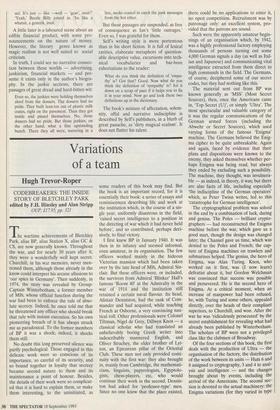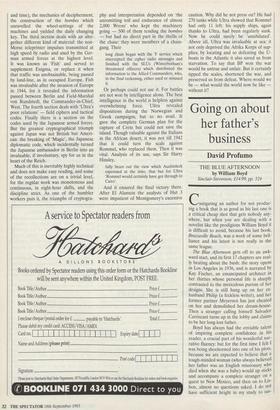Variations of a team
Hugh Trevor-Roper
CODEBREAKERS: THE INSIDE STORY OF BLETCHLEY PARK edited by F.H. Hinsley and Alan Stripp OUP, f17.95, pp. 321 The wartime achievements of Bletchley Park, alias BP, alias Station X, alias GC & CS, are now generally known. Throughout the war, and for nearly 30 years after it, they were a wonderfully well kept secret. Churchill, in his war memoirs, never men- tioned them, although those already in the know could interpret his arcane allusions to `our spies in Germany'. Then suddenly, in 1974, the story was revealed by Group- Captain Winterbotham, a former member of MI6, whose official function during the war had been to enforce the rule of abso- lute secrecy. Indeed, he once told me that he threatened any officer who should break that rule with instant execution. So his own pioneering breach of it has always struck me as paradoxical. To the former members of BP it was a shock; indeed, it shocks them still.
No doubt this long preserved silence was partly psychological. Those engaged in this delicate work were so conscious of its importance, so careful of its security, and so bound together in loyalty that secrecy became second nature to them and its maintenance a point of honour. Besides, the details of their work were so complicat- ed that it is hard to explain them, or make them interesting, to the uninitiated, as some readers of this book may find. But the book is an important record, for it is essentially their book: a series of essays and reminiscences describing life and work at the institution which, in the course of a sin- gle year, uniformly disastrous in the field, `raised secret intelligence to a position in the directing of war which it had never held before', and so contributed, perhaps deci- sively, to final victory.
I first knew BP in January 1940. It was then in its infancy and seemed informal, even amateur, in its organisation. The few officers worked mainly in the hideous Victorian mansion which had been taken over by the late head of MI6, Admiral Sin- clair. But these officers were, or included, the survivors from Admiral `Blinker' Hall's famous `Room 40' at the Admiralty in the war of 1914 and the institution still retained a certain naval flavour. Its head, Alistair Denniston, had the rank of Com- mander and had acquired, while teaching French at Osborne, a very convincing nau- tical roll. Other professionals were Colonel Tiltman, Nigel de Grey, Dillwyn Knox — a classical scholar who had translated an unbelievably boring Greek writer into indescribably mannered English, and Oliver Strachey, the elder brother of Lyt- ton, an Epicurean pillar of the Oriental Club. These men not only provided conti- nuity with the first war: they also brought in, mainly from Cambridge, the mathemati- cians, linguists, papyrologists, Egyptolo- gists, chess-players, etc, who would continue their work in the second. Dennis- ton had asked for 'professor-type' men. Since no one knew that the place existed, there could be no applications to enter it, no open competition. Recruitment was by patronage only: an excellent system, pro- vided that the patrons are sound.
Such were the apparently amateur begin- nings of an organisation which, by 1942, was a highly professional factory employing thousands of persons turning out some 4,000 German signals a day (as well as Ital- ian and Japanese) and communicating vital intelligence extracted from them direct to high commands in the field. The Germans, of course, deciphered some of our secret codes, but they had nothing like this.
The material sent out from BP was known generally as `MSS' (Most Secret Sources), then, once the Americans came in, `Top Secret (U)', or simply `Ultra'. The most spectacular and valuable category of it was the regular communications of the German armed forces (including the Abwehr or Secret Sources), which used varying forms of the famous `Enigma' machine. The Germans believed the Enig- ma cipher to be quite unbreakable. Again and again, faced by evidence that their plans and dispositions were known to the enemy, they asked themselves whether per- haps Enigma was being read, but always they ended by excluding such a possibility. The machine, they thought, was invulnera- ble — as indeed, in theory, it was; but there are also facts of life, including especially `the indiscipline of the German operators' which, as Peter Twinn writes, led. to this `catastrophe for German intelligence'.
The cryptographical problem was solved in the end by a. combination of luck, daring and genius. The Poles — brilliant crypto- graphers — had reconstructed the Enigma machine before the war, which gave us a good start, though the design was changed later; the Channel gave us time, which was denied to the Poles and French; the cap- ture of Enigma machines on trawlers and submarines helped. The genius, the hero of Enigma, was Alan Turing. Knox, who worked on it first, was (I now learn) defeatist about it, but Gordon Welchman was convinced that success was possible and persevered. He is the second hero of Enigma. At a critical moment, when an increase of manpower had been refused, he, with Turing and some others, appealed directly, over the heads of their compliant superiors, -to Churchill, and won. After the war he was `ridiculously persecuted' by the secret establishment for revealing what had already been published by Winterbotham. The scholars of BP were not a privileged class like the clubmen of Broadway. Of the four sections of this book, the first deals with the production of Ultra — the organisation of the factory, the distribution of the work between its units — Huts 6 and 8 assigned to cryptography, 3 and 4 to anal- ysis and intelligence — and the changes brought about by events, including the arrival of the Americans. The second sec- tion is devoted to the actual machinery: the Enigma variations (for they varied in type and time), the mechanics of decipherment, the construction of the bombes which unravelled the wheel-settings of the machines and yielded the daily changing key. The third section deals with an alto- gether different kind of material: the non- Morse teleprinter impulses transmitted at high speed by radio and used by the Ger- man armed forces at the highest level. It was known as 'Fish' and served to supplement Enigma, or replace it when that traffic was unobtainable, being passed by land-line, as in occupied Europe. Fish was invaluable after the invasion of Europe in 1944, for it revealed the information passed between Berlin and Field-Marshal von Rundstedt, the Commander-in-Chief, West. The fourth section deals with 'Ultra's poor relations' — field ciphers and tactical codes. Finally there is a section on the codes used by the Japanese armed forces. But the greatest cryptographical triumph against Japan was not British but Ameri- can: the breaking of 'Magic', the Japanese diplomatic code, which incidentally turned the Japanese ambassador in Berlin into an invaluable, if involuntary, spy for us in the heart of the Reich.
Much of this is inevitably highly technical and does not make easy reading, and some of the recollections are on a trivial level, for the regular work was monotonous and continuous, in eight-hour shifts, and the discipline strict. As one of the humbler workers puts it, the triumphs of cryptogra- phy and interpretation depended on 'the unremitting toil and endurance of almost 2,000 Wrens' who kept the machinery going — 500 of them tending the bombes — but had no direct part in the thrills of the chase: they were members of a chain- gang. Their
long chain began with the Y service which intercepted the cipher radio messages and finished with the SLUs (Winterbotham's threatened officers) which distributed the information to the Allied Commanders, who, in the final reckoning, either used or misused it.
Or perhaps could not use it. For battles are not won by intelligence alone. The best intelligence in the world is helpless against overwhelming force. Ultra revealed dispositions during the Norwegian and Greek campaigns, but to no avail. It gave the complete German plan for the capture of Crete but could not save the island. Though valuable against the Italians in the African desert, it was not till 1942 that it could turn the scale against Rommel, who replaced them. Then it was vital. Analysis of its use, says Sir Harry Hinsley,
fully bears out the view which Auchinleck expressed at the time, that but for Ultra 'Rommel would certainly have got through to Cairo'.
And it ensured the final victory there. After El Alamein the analysts of Hut 3 were impatient of Montgomery's excessive caution. Why did he not press on? He had 270 tanks while Ultra showed that Rommel had only 11 left: his supply ships, again thanks to Ultra, had been regularly sunk. Now he could surely be 'annihilated'. Above all, Ultra was invaluable at sea: it not only deprived the Afrika Korps of sup- plies; by locating and so defeating the U- boats in the Atlantic it also saved us from starvation. To say that BP won the war would be untrue and unfair. But it certainly tipped the scales, shortened the war, and preserved us from defeat. Where would we be — what would the world now be like without it?



































































 Previous page
Previous page